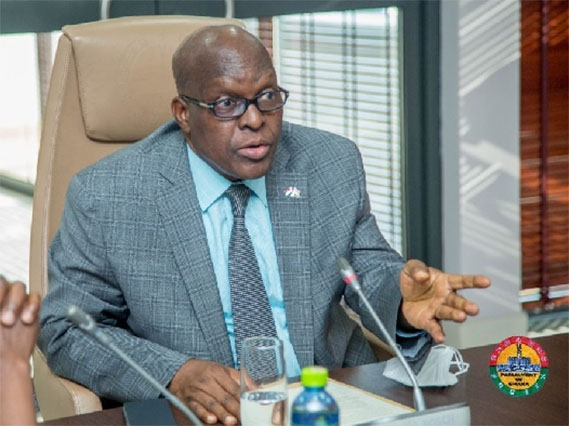Alban Bagbin
Speaker of Parliament, Alban Sumana Kingsford Bagbin, has categorically rejected assertions that Ghana is currently embroiled in a constitutional crisis.
This bold statement comes amidst heightened tensions and disagreements between the House and the Supreme Court regarding vacant parliamentary seats.
Chief Justice, Gertrude Araba Esaaba Sackey Torkornoo, on Wednesday, October 30, 2024, described the current impasse in Parliament as a ‘constitutional crisis’ during court proceedings on the matter.
According to her, the issue before the court constitutes a national emergency that necessitates prompt and timely redress.
“This is a constitutional crisis. We’re living in a country where the Parliament is not sitting. What is going on?” The Chief Justice quizzed Thaddeus Sory, counsel of the Speaker, why he had not filed Mr. Bagbin’s documents before the deadline which was October 30, 2024.
Parliament Intact
However, addressing the media in Parliament yesterday, the Speaker insisted that Ghana is not in a constitutional crisis, emphasising that the mechanisms of the country’s democratic system remain intact, functioning, and responsive to the nation’s needs.
“There is no constitutional crisis in this country. I repeat, there is no constitutional crisis. The Parliament of Ghana is alive and working,” the Speaker asserted, urging Ghanaians not to be misled by misinformation and to allow democratic processes to work.
He explained that recent parliamentary adjournments, prompted by a walkout from the New Patriotic Party (NPP) over disagreements on key issues, were procedural and lawful, executed under his authority due to lack of quorum.
According to him, the democratic system adopted by the country recognises that disagreements will occur, while challenges and problems will arise.
Mechanisms
“The system has put in place mechanisms, structures, and institutions, processes, procedures and rules to follow and apply to resolve the disagreement, convert the challenges into opportunities and provide solutions to the problems. This is what is being pursued and applied. There is no constitutional crisis in the country,” he insisted.
Mr. Bagbin said the disagreement between him and the Majority Leader, Alexander Afenyo-Markin, is within the scope of Parliament’s rules and does not signify a crisis.
He, therefore, called for patience, tolerance, and discipline, noting, “Democracy is about the rule of law. Please, let the law work.”
He underscored the importance of dialogue and consensus, advising Ghanaians to avoid fear-mongering and inflammatory language.
Reflecting on his extensive experience—over three decades as a politician and four decades as a public servant—the Speaker pledged to leave Parliament stronger than he found it.
Judicial/Executive Influence
The Speaker also expressed concerns about what he termed as judicial and executive influence over Parliament, which, he argued, could weaken the institution and undermine the country’s democratic structure.
“It is becoming increasingly clear, the Judiciary and the Executive are colluding to weaken Parliament,” he claimed.
The Speaker also addressed the role of the Judiciary, specifically the Supreme Court’s involvement in parliamentary affairs.
He again expressed concern over what he described as an emerging trend where lawmakers seek judicial intervention on matters that, in his view, should be settled within Parliament.
Such actions, he argued, risk compromising the integrity and independence of the legislative body.
Mr. Bagbin cautioned against “power play between the arms of government,” noting that it has the potential to erode democratic principles and the people’s trust in those institutions.
For him, the suit before the Supreme Court raises not just legal questions but, more importantly, has profound implications for the country’s democratic system of governance.
“At its core, is the very essence of our democracy. While many legal arguments have been advanced in and out of the court, recognise the fact that the connected political and governance implications have not been addressed sufficiently to enrich the national discourse,” he intimated.
In his view, this should also be vigorously articulated to give a holistic approach to resolving the issue.
Parliament Composition
Referring to the balanced composition of the current hung Parliament, with equal representation of the two main political parties, the Speaker shared insights into the complexities and opportunities presented by this configuration.
“The 2020 elections clearly indicated that Ghanaians preferred a more inclusive governance model,” he remarked, pointing out that this dynamic calls for both collaboration and compromise.
Mr. Bagbin expressed confidence that the ongoing disagreements will make the country’s democracy stronger and more vibrant in the future.
Constitutional Supremacy
“I believe in the supremacy of the Constitution, mark my words, the supremacy of the Constitution, not the supremacy of the Judiciary or Supreme Court.
“I also believe in a vibrant Parliament that is respected and accorded its due on political questions as long established by law and decided cases.
“A Parliament that understands, reflects, and embodies the will of the people and defends its constitutional prerogatives only works in the interest of Ghana and Ghanaians,” he asserted.
By Ernest Kofi Adu, Parliament House
